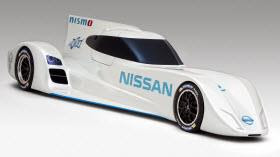Purely petroleum-powered cars have always ruled racing. But more alternative-fuel rivals are preparing to enter the field.
We reported earlier that Aston Martin contested a hydrogen-gasoline hybrid at the ADAC Zurich 24 Hours of Nürburgring in Germany in May, while a modified Le Mans car recently set an electric vehicle land speed record of 204 mph.
Now Nissan has revealed its prototype Zero Emission On Demand Racing Car (ZEOD RC) that will debut at next year's 24 Hours of Le Mans -- and which the company claims is “the world's fastest electric racing car” that can reach more than 186 mph.
But like Aston Martin's hydrogen-powered Rapide, the ZEOD RC will also require gasoline to run, since current battery technology doesn’t offer the energy storage or fast-charging capability needed to complete 24 hours of racing in a pure electric car. Andy Palmer, executive vice president at Nissan, said that the driver would be able to switch between electric and gasoline operation on the fly.
The ZEOD RC will compete in the Garage 56 category at Le Mans that was added to showcase vehicles using new and innovative technology, and in which Nissan’s controversial DeltaWing racecar competed in 2012. Before the automaker returns to the world's premier endurance race next June, engineers will test multiple variations of new electric powertrains that could spawn a range of alternative-fuel race cars.
Palmer said in a statement that the Nissan ZEOD RC “is a natural progression that follows on from the development of … the Leaf RC race car prototype,” which MSN Autos had the opportunity to drive last year in Dubai and uses the same 107-horsepower electric motor as in the production Nissan Leaf.
Ben Bowlby, Nissan's director of Motorsport Innovation and the chief designer of the ZEOD RC noted that the car’s development will be crucial to the "electrification" of future racecars.
Bowlby, who worked on Nissan’s DeltaWing program -- to which the ZEOD RC bears a strong resemblance -- added that the ZEOD RC design team “concentrated heavily on packaging and aerodynamic efficiency that will not only provide extreme performance but high levels of energy efficiency.”
Nissan will apply some of this knowledge to the next Nissan GT-R, which will pack a hybrid system containing a small lithium-ion battery for extra performance, according to Road & Track.
The Nissan ZEOD RC will make its testing debut later this summer. And even though the car won’t compete until next year's Le Mans, Nissan will be revealing aspects of the ZEOD RC program and peaks at the progress of the prototype on YouTube and the NISMO.TV channel.
We reported earlier that Aston Martin contested a hydrogen-gasoline hybrid at the ADAC Zurich 24 Hours of Nürburgring in Germany in May, while a modified Le Mans car recently set an electric vehicle land speed record of 204 mph.
Now Nissan has revealed its prototype Zero Emission On Demand Racing Car (ZEOD RC) that will debut at next year's 24 Hours of Le Mans -- and which the company claims is “the world's fastest electric racing car” that can reach more than 186 mph.
But like Aston Martin's hydrogen-powered Rapide, the ZEOD RC will also require gasoline to run, since current battery technology doesn’t offer the energy storage or fast-charging capability needed to complete 24 hours of racing in a pure electric car. Andy Palmer, executive vice president at Nissan, said that the driver would be able to switch between electric and gasoline operation on the fly.
The ZEOD RC will compete in the Garage 56 category at Le Mans that was added to showcase vehicles using new and innovative technology, and in which Nissan’s controversial DeltaWing racecar competed in 2012. Before the automaker returns to the world's premier endurance race next June, engineers will test multiple variations of new electric powertrains that could spawn a range of alternative-fuel race cars.
Palmer said in a statement that the Nissan ZEOD RC “is a natural progression that follows on from the development of … the Leaf RC race car prototype,” which MSN Autos had the opportunity to drive last year in Dubai and uses the same 107-horsepower electric motor as in the production Nissan Leaf.
Ben Bowlby, Nissan's director of Motorsport Innovation and the chief designer of the ZEOD RC noted that the car’s development will be crucial to the "electrification" of future racecars.
Bowlby, who worked on Nissan’s DeltaWing program -- to which the ZEOD RC bears a strong resemblance -- added that the ZEOD RC design team “concentrated heavily on packaging and aerodynamic efficiency that will not only provide extreme performance but high levels of energy efficiency.”
Nissan will apply some of this knowledge to the next Nissan GT-R, which will pack a hybrid system containing a small lithium-ion battery for extra performance, according to Road & Track.
The Nissan ZEOD RC will make its testing debut later this summer. And even though the car won’t compete until next year's Le Mans, Nissan will be revealing aspects of the ZEOD RC program and peaks at the progress of the prototype on YouTube and the NISMO.TV channel.

No comments:
Post a Comment